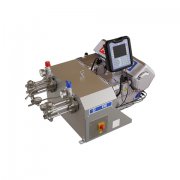The first patient has been scanned in a Phase I clinical trial for an investigational fluorine-18 (18F) CD8-targeted imaging radiopharmaceutical
18F-CD8 Positron Emission Tomography (PET) radiopharmaceutical could allow both same-day and subsequent sequential imaging, potentially facilitating earlier monitoring of a patient’s response once they start treatment and enabling physicians to select appropriate treatment sooner
Identifying patients more likely to respond to immunotherapies could help avoid unnecessary cancer treatment and enable physicians to consider earlier alternative treatment options1
CHALFONT ST. GILES, England--(BUSINESS WIRE)--With immunotherapy emerging as one of the most important treatment options in oncology, GE HealthCare has today announced the first patient scanned in a Phase I clinical trial2 of a first-of-its kind fluorine-18 PET radiopharmaceutical ([18F]GEH200521) specific for CD8, which is expressed on CD8+ T cells - a subpopulation of white blood cells which fight cancer.
There are around 5000 immunotherapies in development today1, almost all of which work by activating CD8+ T cells both within and outside a tumor. The clinical trial will use this investigational radiopharmaceutical to help understand if patients have CD8+ T cells in their tumors and will, therefore, be more likely to respond to immune checkpoint inhibitors, the main class of immunotherapies currently approved for use. The study will also then help identify early response to immunotherapies, using sequential whole-body imaging to monitor CD8 changes over time, enabling physicians to switch patients who are not responding to alternative treatment options sooner.
The clinical trial, initiated in the Netherlands, is studying the safety and tolerability of the 18F-labeled radiopharmaceutical in patients with solid tumor malignancies. It will also determine the optimal timing for a patient scan following the administration of 18F-CD8 PET, which would be within the same day and, potentially, as soon as one hour, reducing the need for separate or multiple visits - providing more convenience for patients. 18F-CD8 PET may enable sequential imaging which could increase the likelihood of capturing even modest spatial and temporal changes in CD8+ T cells as soon as two to four days after an initial dose of immunotherapy or combinations of agents, compared to months with the standard RECIST (response evaluation criteria in solid tumors) approaches.
Only 20-40 percent3 of patients typically respond to immune checkpoint inhibitors. If successful, this tracer could help select patients more likely to respond to the appropriate immunotherapy. This could also avoid unnecessary treatment for those less likely to respond, or those not responding, who could be offered alternative treatment options earlier. For pharmaceutical companies and researchers, using this tracer to better understand the mechanism of action - i.e. the effect of immunotherapies on a patient’s immune response to their cancer - could, potentially, enable them to better select patients to participate in clinical trials and bring new immunotherapies to market.
Dr. Ken Herrmann, Section Editor of the Journal of Nuclear Medicine, said: “The clinical translation of a fluorine-18 PET tracer that targets CD8 would be a significant breakthrough in the field, not just for patients but also in the world of drug development.”
Dr. Paul Evans, Head of Global Research & Development with GE HealthCare’s Pharmaceutical Diagnostics segment, said: “Immunotherapies can transform patients’ lives but low response rates, the potential of serious adverse effects, and high costs present challenges. That’s why research in this area is so important, to help individualize diagnosis and treatment for each patient. We will continue to innovate in this space, working alongside pharmaceutical companies and the oncology research community to develop a new class of complementary and companion imaging diagnostics.”
GE HealthCare’s Pharmaceutical Diagnostics segment is a global leader in imaging agents used to support around 100 million procedures per year globally, equivalent to three patient procedures every second. Its Molecular Imaging portfolio combines established proprietary products across cardiology, neurology, and oncology, with an innovative pipeline, all aimed at enabling better-informed diagnosis and monitoring for improved therapy decision-making and clinical outcomes.
About GE HealthCare Technologies Inc.
GE HealthCare is a leading global medical technology, pharmaceutical diagnostics, and digital solutions innovator, dedicated to providing integrated solutions, services, and data analytics to make hospitals more efficient, clinicians more effective, therapies more precise, and patients healthier and happier. Serving patients and providers for more than 100 years, GE HealthCare is advancing personalized, connected, and compassionate care, while simplifying the patient’s journey across the care pathway. Together our Imaging, Ultrasound, Patient Care Solutions, and Pharmaceutical Diagnostics businesses help improve patient care from diagnosis, to therapy, to monitoring. We are an $18.3 billion business with 50,000 employees working to create a world where healthcare has no limits.
Follow us on Facebook, LinkedIn, Twitter, and Insights for the latest news, or visit our website https://www.gehealthcare.com/ for more information.
1. Shankar L. et al. Harnessing imaging tools to guide immunotherapy trials: summary from the National Cancer Institute Cancer Imaging Steering Committee workshop. Lancet Oncology 2023; 24(3): e133-e143. doi: 10.1016/S1470-2045(22)00742-2
2. Further information available at clinicaltrials.gov - ClinicalTrials.gov Identifier: NCT05629689 - A Study to Evaluate GEH200520/GEH200521 (18F) Safety and Tolerability When Used for PET Scans in Patients With Solid Tumour Malignancies
3. Fruhwirth, G. O., Kneilling, M., De Vries, I. J. M., Weigelin, B., Srinivas, M., & Aarntzen, E. H. (2018). The Potential of In Vivo Imaging for Optimization of Molecular and Cellular Anti-cancer Immunotherapies. Molecular Imaging and Biology, 20(5), 696–704. https://doi.org/10.1007/s11307-018-1254-3









